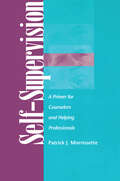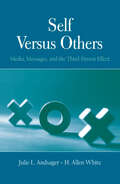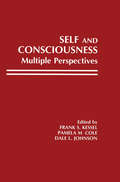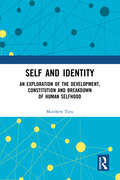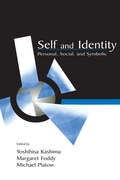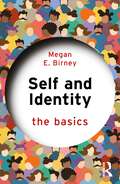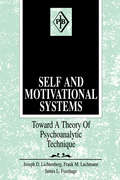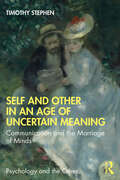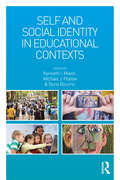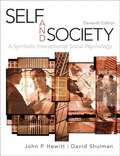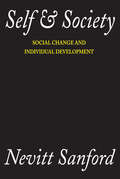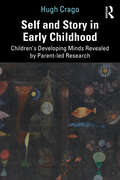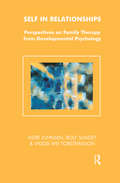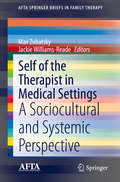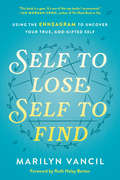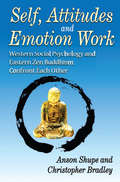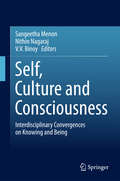- Table View
- List View
Self Supervision: A Primer for Counselors and Human Service Professionals
by Patrick J. MorrissetteSelf-Supervision synthesizes past and current literature on the theory and practice of self-supervision and provides counselors and human service professionals with a plan for the pursuit of independent professional growth.Beginning with a historical overview and discussion of the counselor-client relationship, boundary transgressions, the counselor's family-of-origin and unresolved issues, and disclosure styles, the author provides the reader with a foundation for understanding the issues that must be examined when evaluating one's own work. He then outlines the reflective process and describes the actual practice, guiding principles, and strategies for self-supervision. Finally the author presents several proactive measures for counselor self-care that readers will find useful.
Self Versus Others: Media, Messages, and the Third-Person Effect (Routledge Communication Series)
by Julie L. Andsager H. Allen WhiteSelf Versus Others explores the third-person effect and its role in media as a means of persuasion. This scholarly work synthesizes more than two decades of research on the third-person effect, the process in which individuals do not perceive themselves to be impacted by particular messages—such as persuaded to engage in risky behaviors or encouraged to be violent—but they believe others will be. Authors Julie L. Andsager and H. Allen White focus their analysis specifically on the role of media and media messages, and assert that the third-person effect functions as a means of persuasion. They explore the underlying concepts and connections this effect shares with established theories of persuasion and mediated communication. The only volume to date focusing on the topic, Self Versus Others demonstrates the significant impact persuasion has on public opinion, behavior, and policy. As such, understanding the means through which persuasion can be accomplished thereby provides a powerful tool. Timely and succinct, this book:*provides thorough synthesis of third-person effect literature;*argues that systematic versus heuristic processing underlies third-person perceptions; and*conceptually links third-person effects with co-orientation. Intended for communication scholars with an interest in persuasion, as well as those in key areas including mass communication, health communication, and political communication, this book is also appropriate for advanced courses in persuasion, communication theory, and campaigns.
Self Within Marriage: The Foundation for Lasting Relationships
by Richard M. ZeitnerSelf Within Marriage combines the theoretical orientations of object-relations theory, self psychology, and systems theory as a way of understanding and working with couples and individuals whose relationship and emotional difficulties have centered on the common conundrum of balancing individuality and intimacy. Based on detailed case examples and couple therapy techniques, Self Within Marriage provides individual and couple therapists with a refreshing new framework for working with clients and for helping them understand who they are as individuals and as partners.
Self and Consciousness: Multiple Perspectives
by Dale L. Johnson Pamela M. Cole Frank S. KesselThis volume contains an array of essays that reflect, and reflect upon, the recent revival of scholarly interest in the self and consciousness. Various relevant issues are addressed in conceptually challenging ways, such as how consciousness and different forms of self-relevant experience develop in infancy and childhood and are related to the acquisition of skill; the role of the self in social development; the phenomenology of being conscious and its metapsychological implications; and the cultural foundations of conceptualizations of consciousness. Written by notable scholars in several areas of psychology, philosophy, cognitive neuroscience, and anthropology, the essays are of interest to readers from a variety of disciplines concerned with central, substantive questions in contemporary social science, and the humanities.
Self and Emotional Life: Philosophy, Psychoanalysis, and Neuroscience (Insurrections: Critical Studies in Religion, Politics, and Culture)
by Catherine Malabou Adrian JohnstonAdrian Johnston and Catherine Malabou defy theoretical humanities' deeply-entrenched resistance to engagements with the life sciences. Rather than treat biology and its branches as hopelessly reductive and politically suspect, they view recent advances in neurobiology and its adjacent scientific fields as providing crucial catalysts to a radical rethinking of subjectivity.Merging three distinct disciplines—European philosophy from Descartes to the present, Freudian-Lacanian psychoanalysis, and affective neuroscience—Johnston and Malabou triangulate the emotional life of affective subjects as conceptualized in philosophy and psychoanalysis with neuroscience. Their experiments yield different outcomes. Johnston finds psychoanalysis and neurobiology have the potential to enrich each other, though affective neuroscience demands a reconsideration of whether affects can be unconscious. Investigating this vexed issue has profound implications for theoretical and practical analysis, as well as philosophical understandings of the emotions.Malabou believes scientific explorations of the brain seriously problematize established notions of affective subjectivity in Continental philosophy and Freudian-Lacanian analysis. She confronts philosophy and psychoanalysis with something neither field has seriously considered: the concept of wonder and the cold, disturbing visage of those who have been affected by disease or injury, such that they are no longer affected emotionally. At stake in this exchange are some of philosophy's most important claims concerning the relationship between the subjective mind and the objective body, the structures and dynamics of the unconscious dimensions of mental life, the role emotion plays in making us human, and the functional differences between philosophy and science.
Self and Identity: An Exploration of the Development, Constitution and Breakdown of Human Selfhood (Explorations in Mental Health)
by Matthew TieuWhat is a self? What does it mean to have selfhood? What is the relationship between selfhood and identity? These are puzzling questions that philosophers, psychologists, social scientists, and many other researchers often grapple with. Self and Identity is a book that explores and brings together relevant ideas on selfhood and identity, while also helping to clarify some important and long standing scientific and philosophical debates. It will enable readers to understand the difference between selves in humans and other animals, and the different selves that we come to possess from when we are born to when we become old. It also explains how and why the self might break down due to mental illness, thereby providing insight into how we might treat illnesses such as dementia and depression, both of which are conditions that fundamentally affect our selfhood. Taking an important step towards clarifying our understanding of human selfhood and applying it to mental illness, this book will be of great interest to researchers and postgraduate students exploring philosophical questions of selfhood, as well as those examining the connection to clinical disorders.
Self and Identity: Personal, Social, and Symbolic
by Michael J. Platow Margaret Foddy Yoshihisa KashimaThis edited volume outlines the latest meta-theoretical and theoretical contexts of self-research. Self and Identity examines theoretical accounts of human experience within the contemporary socio-cultural milieu and attempts to answer the question of what it means to be human. It provides a clear structure within which to conceptualize contemporary empirical research on self and identity in terms of personal, social, and symbolic aspects. In so doing, it identifies the symbolic aspect as an emerging area of contemporary significance. Featuring contributions from a distinguished group of scholars and therapists, the book is organized into four parts. The editors provide section introductions to demonstrate how each chapter relates to the book's overall theme, as well as how the chapter authors responded to the editors' charge to go beyond the social cognitive theory of the self. Part I describes the current meta-theoretical context of self-research, the editors' interpretation of the social cognitive approach to the self, and an emerging alternative theory, the Connectionist Approach. Part II highlights personal perspectives on selfhood, Part III focuses on social perspectives, and Part IV reviews symbolic processes. The concluding chapter reviews the book's major themes with overlapping themes and intellectual disputes. The book is intended for graduate students and researchers in social and personality psychology interested in self and identity and self-research. It may also be used as a supplemental text in advanced-level courses on self and identity.
Self and Identity: The Basics (The Basics)
by Megan E. BirneySelf and Identity: The Basics is a jargon-free and accessible introduction that draws on key theories and ideas in Social Psychology to explore the ways that other people affect our thoughts, feelings, and behaviours. Highlighting selfhood as a function of identity, the book shows that it is our relationships with others in our social world that largely determine who we are. "Who am I?" It’s a question that most all humans have grappled with at some point or another. This book seeks to answer this question through relatable examples that show how psychological theory can be applied to our own lives. It considers the philosophical and psychological context in which ideas about selfhood have developed and reviews the ways that the people around us, and the groups that we belong to, affect who we are. Finally, these ideas are considered in the context of real-world phenomena and behaviours; for instance, how we use language, conflict between groups, and social influence. With a glossary of key terms, suggestions for further reading, and chapter summaries, this book is an ideal introduction for students of social psychology and related fields. It will be of interest to anyone who wants to gain social psychological insight into who they are and how others got them there.
Self and Meaning in the Lives of Older People
by Peter G. Coleman Coleman, Peter G. and Ivani-Chalian, Christine and Robinson, Maureen Christine Ivani-Chalian Maureen RobinsonMore than thirty-five years ago, a longitudinal study was established to research the health and well-being of older people living in an English city. Self and Meaning in the Lives of Older People provides a unique set of portraits of forty members of this group who were interviewed in depth from their later seventies onwards. Focusing on sense of self-esteem and, especially, of continued meaning in life following the loss of a spouse and onset of frailty, this book sensitively illustrates these persons' efforts to maintain independence, to continue to have a sense of belonging and to contribute to the lives of others. It examines both the psychological and the social resources needed to flourish in later life and draws attention to this generation's ability to benefit from strong family support and from belonging to a faith community. In conclusion, it questions whether future generations will be as resilient.
Self and Motivational Systems: Towards A Theory of Psychoanalytic Technique (Psychoanalytic Inquiry Book Series #13)
by Joseph D. Lichtenberg Frank M. Lachmann James L. FosshageIn this sequel to Lichtenberg's Psychoanalysis and Motivation (TAP, 1989), the authors show how their revised theory of motivation provides the foundation for a new approach to psychoanalytic technique. The approach in Self and Motivational Systemsemphasizes a finely honed sensitivity to moment-to-moment analytic exchanges and an appreciation of which motivational system is dominant during that exchange. Throughout, the authors stress the creative power of psychoanalysis as a joint effort shaped by the intersubjective context of a particular analysand communicating and interacting with a particular analyst. At the heart of the analytic relationship is the analysand's expectation of evoking a vitalizing selfobject experience from the analyst and the analyst's expectation, in turn, of evoking a selfobject experience of efficacy from his or her work with the analysand.
Self and Nation: Categorization, Contestation and Mobilization
by Stephen D. Reicher Dr Nick Hopkins`Here is a rare book, a truly helpful piece of work on the psychology of nationalism. Stephen Reicher and Nick Hopkins, of St Andrews and Dundee Universities, focus much of their study of recent Scottish experience, drawing on inter-views with political activists. The cast light on why our `Unionists' and nationalists feel so sure their side represents our national identity and the other lot doesn't. For once it is a compliment to say a book raises more questions than it answers. Stephen Reicher and Nick Hopkins open up large questions closer inspection' - Glasgow Herald `In this impressive book Stephen Reicher and Nick Hopkins draw from a wealth of research to address issues of nationality, national identity and nationalism that lie at the heart of core topics in social psychology and its cognate disciplines. They have produced a powerful and scholarly text that interweaves an abundance of rich empirical data with a broad-reaching and timely theoretical statement. Moreover, the content is not confined to matters of national identity but also extends to treatments of stereotyping, prejudice, intergroup conflict, leadership, collective action, and the self .... For all these reasons, the book should serve essential and compelling reading for a very broad audience' - S Alexander Haslam, Australian National University `Stephen Reicher and Nick Hopkins write with elegance and clarity, drawing the reader into their argument, without losing any of its complexity and nuance. This book deserves to make a major impact in studies of nationalism. It ought to become a classic.... I'm quite bowled over - it's really brilliant' - David McCrone, Edinburgh University
Self and No-Self: Continuing the Dialogue Between Buddhism and Psychotherapy
by Dale Mathers Melvin E. Miller Osamu AndoThis collection explores the growing interface between Eastern and Western concepts of what it is to be human from analytical psychology, psychoanalytic and Buddhist perspectives. The relationship between these different approaches has been discussed for decades, with each discipline inviting its followers to explore the depths of the psyche and confront the sometimes difficult psychological experiences that can emerge during any in-depth exploration of mental processes. Self and No-Self considers topics discussed at the Self and No-Self conference in Kyoto, Japan in 2006. International experts from practical and theoretical backgrounds compare and contrast Buddhist and psychological traditions, providing a fresh insight on the relationship between the two. Areas covered include: the concept of self Buddhist theory and practice psychotherapeutic theory and practice mysticism and spirituality myth and fairy tale. This book explains how a Buddhist approach can be integrated into the clinical setting and will interest seasoned practitioners and theoreticians from analytical psychology, psychoanalytic and Buddhist backgrounds, as well as novices in these fields.
Self and Other in an Age of Uncertain Meaning: Communication and the Marriage of Minds (Psychology and the Other)
by Timothy StephenSelf and Other in an Age of Uncertain Meaning explores the nature and origins of widespread problems of self in modern societies. It examines the paradoxical interplay between the modern world's many benefits and freedoms, and its mounting social challenges and psycho-emotional impacts. Over time the character of consciousness has shifted in concert with societal trends. The experienced world has become more nuanced, fragmented, and uncertain, as well as increasingly personal and intimate, reshaping social relationships. Chapters analyze the interdependence of language, mind, intimacy, the self, and culture, arguing that as the coevolution of these five factors produced the modern world, many features of contemporary culture have become disruptive to security of being. The book explores the importance to the vital sense of self in constructing relationships based in mutual recognition of moral and intellectual equality between partners.Rich with examples from everyday experience, this text offers profound insights for those interested in sociology, psychoanalysis, psychology, communication, history, and culture.
Self and Other: Object Relations in Psychoanalysis and Literature (Open Access Lib And Hc Ser.)
by Robert RogersIn Self and Other, Robert Rogers presents a powerful argument for the adoption of a theory of object relations, combining the best features of traditional psychoanalytic theory with contemporary views on attachment behavior and intersubjectivity. Rogers discusses theory in relation both to actual psychoanalytic case histories and imagined selves found in literature, and provides a critical rereading of the case histories of Freud, Winnicott, Lichtenstein, Sechehaye, and Bettelheim. At once scientific and humanistic, Self and Other engagingly draws from theoretical, clinical, and literary traditions. It will appeal to psychoanalysts as well as to literary scholars interested in the application of psychoanalysis to literature.
Self and Other: Object Relations in Psychoanalysis and Literature (Psychoanalytic Crossroads)
by Robert RogersIn Self and Other, Robert Rogers presents a powerful argument for the adoption of a theory of object relations, combining the best features of traditional psychoanalytic theory with contemporary views on attachment behavior and intersubjectivity. Rogers discusses theory in relation both to actual psychoanalytic case histories and imagined selves found in literature, and provides a critical rereading of the case histories of Freud, Winnicott, Lichtenstein, Sechehaye, and Bettelheim. At once scientific and humanistic, Self and Other engagingly draws from theoretical, clinical, and literary traditions. It will appeal to psychoanalysts as well as to literary scholars interested in the application of psychoanalysis to literature.
Self and Social Identity in Educational Contexts
by Kenneth I. Mavor, Michael J. Platow and Boris BizumicThis innovative volume integrates social identity theory with research on teaching and education to shed new and fruitful light on a variety of different pedagogical concerns and practices. It brings together researchers at the cutting edge of new developments with a wealth of teaching and research experience. The work in this volume will have a significant impact in two main ways. First and foremost, the social identity approach that is applied will provide the theoretical and empirical platform for the development of new and creative forms of practice in educational settings. Just as the application of this theory has made significant contributions in organisational and health settings, a similar benefit will accrue for conceptual and practical developments related to learners and educators – from small learning groups to larger institutional settings – and in the development of professional identities that reach beyond the classroom. The chapters demonstrate the potential of applying social identity theory to education and will stimulate increased research activity and interest in this domain. By focusing on self, social identity and education, this volume investigates with unprecedented clarity the social and psychological processes by which learners’ personal and social self-concepts shape and enhance learning and teaching. Self and Social Identity in Educational Contexts will appeal to advanced students and researchers in education, psychology and social identity theory. It will also be of immense value to educational leaders and practitioners, particularly at tertiary level.
Self and Society: A Symbolic Interactionist Social Psychology
by John P. Hewitt; David ShulmanThis book has been used not only in the classroom, but also cited in literature as an authoritative source. Self and Society is not a distillation of textbook knowledge, but rather, a thoughtful, well-organized presentation that makes its own contribution to the advancement of symbolic interactionism.
Self and Society: Social Change and Individual Development
by Nevitt SanfordHow does his social environment change an individual, and why do these changes occur? Can social institutions be shaped and molded profoundly enough to afford each member of a society his maximum potential for happiness, effective functioning, and complete development? In this new work a distinguished psychologist evolves a theory of personality and society designed to help guide the work of institutions responsible for individual growth and development. Drawing on his vast experience--as an educator, a prison psychologist, a practicing psychoanalyst, and as the director of major studies in child development, personality assessment, the social psychology of higher education, and alcoholism and related problems--Professor Sanford has designed a developmental model intended to guide work in institutions which mold the individual: from family through schools, colleges, child guidance clinics, and mental hospitals. With exceptional lucidity, he examines the central issues in furthering desirable change through intervention in individual and group processes. He achieves notable advances in integrating personality theory and sociological theory: he joins psychoanalytic "ego psychologists" and other personality theorists in developing a dynamic-organismic theory broader than that of classical psychoanalysis and more in keeping with contemporary social theory. The author's clear style and firm grasp of his subject add further to the significance of Self and Society. It will be a stimulating textbook in social psychology, personality, and culture, and personality, and will make indispensable reading for behavioral scientists, psychiatrists, and educators, as well as for all professionals who work to promote mental health, education and social welfare.
Self and Story in Early Childhood: Children’s Developing Minds Revealed by Parent-led Research
by Hugh CragoOur children grow up into a world of stories—in books, on screens—but what do they make of the stories we offer them? What do they think and feel as they listen to a parent read a picture-book? What if a story confuses or upsets them? Over the past fifty years, several intelligent, committed mothers undertook the onerous task of recording exactly what their children said and did in response to the stories they shared. Some of their records extended over five years, or even longer. Their research, done without funding or academic supervision, offers us unparalleled insight into children’s minds long before they learn to speak—let alone learn to read. In Self and Story in Early Childhood, Hugh Crago draws on his unusual combination of expertise in literary studies, developmental psychology and psychotherapy to re-examine the startling implications of this neglected body of evidence. He highlights how much children can achieve without formal teaching, but with the supportive presence of a trusted adult who will participate with them in the story experience. This book will be of great interest to scholars of developmental psychology, early literacy and narratology, as well as to professionals working with preschoolers. Most of all, it will fascinate parents who themselves share stories with their child.
Self in Relationships: Perspectives on Family Therapy from Developmental Psychology (The Systemic Thinking and Practice Series)
by Daniel Stern David Campbell Ros Draper Astri Johnsen Rolf Sundet Vigdis Wie TorsteinssonInspired by Daniel Stern's work on self-development, the authors suggest that by combining systemic therapy with a psychoanalytical aspect, family therapy can reach new depths. They argue that this will enrich our understanding of the relationships beween parents and children, and between siblings. There have been changes within psychoanalysis and family therapy which we believe can enrich both these theoretical fields. The idea is not to integrate but rather to bring about a mutual curiosity in these two areas, which may result in dialogues with each other and create reservoirs for ideas and practices which have been found to be useful.
Self in the World: Connecting Life's Extremes
by Keith HartEminent anthropologist Keith Hart draws on the humanities, popular culture and his own experiences to help readers explore their own place in history. We each embark on two life journeys – one out into the world, the other inward to the self. With these journeys in mind, anthropologist, amateur economist and globetrotter Keith Hart reflects on a life of learning, sharing and remembering to offer readers the means of connecting life’s extremes – individual and society, local and global, personal and impersonal dimensions of existence and explores what it is that makes us fully human. “This is a work of great originality. Keith Hart has had an unorthodox academic career and it has liberated him in many ways from academic pieties. His background in African ethnography gives him a fascinating angle on all sorts of things, not least the possibility of a more African-influenced global future. The book is full of surprises and mind-shifting observations. I actually couldn't put it down.”—Sherry B. Ortner, UCLA From the introduction: People have many sides, but I will focus here on two. Each of us is a biological organism with a historical personality that together make us a unique individual. But we cannot live outside society which shapes us in unfathomable ways. Human beings must learn to be self-reliant (not self-interested) in small and large ways: no-one will brush your teeth for you or save you from being run over while crossing the street. We each must also learn to belong to others, merging personal identity in a plethora of social relations and categories. Modern ideology insists that being individual and mutual is problematic. The culture of capitalist societies anticipates a conflict between them. Yet they are inseparable aspects of human nature.
Self of the Therapist in Medical Settings: A Sociocultural and Systemic Perspective (AFTA SpringerBriefs in Family Therapy)
by Max Zubatsky Jackie Williams-ReadeThis brief explores how the “person” of the therapist is developed when training and working in medical settings. It highlights important and often unspoken topics such as the personal, professional, cultural, ethical, and competency dilemmas new clinicians regularly face. The brief also addresses how personal experience with illness, death, cultural differences, and stigma may impact professionals in everyday practice. Topics featured in this Brief include:Helpful tips and tricks for new professionals entering a medical setting for the first time.Working with patients who suffer from chronic and terminal illnesses.Sociocultural norms and values that are often present in a medical setting.A new framework for identifying and treating professional burnout.How to handle ethical situations in medical organizations. Self of the Therapist in Medical Settings is a must-have resource for clinicians, professionals, supervisors, and faculty working in medical settings.
Self to Lose, Self to Find: Using the Enneagram to Uncover Your True, God-Gifted Self
by Marilyn VancilDiscover the growth that&’s possible when we understand our authentic selves as God intended by exploring more deeply the Enneagram tool, paired with profound scriptural insights. &“This book is a gem. It&’s one of the top five books I recommend on the Enneagram.&”—Ian Morgan Cron, author of The Road Back to You &“An accessible, biblical and practical roadmap for anyone who wants to live fully into their true, authentic, God-given identity. I highly recommend it!&”—Brenda Salter McNeil, author of Becoming BraveThe Enneagram—a system of nine interconnected personality types—has been developed over many years to offer opportunities for personal development and provide a foundation for understanding others.Now a certified Enneagram coach shows how a scriptural perspective can lead us to a path of freedom. In Self to Lose, Self to Find, Marilyn Vancil unpacks our human dilemma, sets the scriptural foundation, explores the nine Enneagram personalities, and shows us practical ways to have a more meaningful life and healthier relationships. At its best, the Enneagram doesn't merely describe who we are, but shows us why we do what we do. It invites us to see the innate gifts and inclinations of our original design—the person we were before trials and traumas began to shape us. It also reveals the strategies and false narratives that keep us from becoming who we're truly meant to be.Vancil offers a compelling biblical case for the Enneagram by drawing from John 12:24, which describes how we, like seeds, construct a protective coat that helps us survive in a world where we encounter challenges and insecurities. But for us to truly live a fruitful life, we must allow the protective coat to soften and fall away in order to grow.This is what sets Vancil apart as both a seasoned Enneagram expert and a spiritual director: Within a scriptural context, she demonstrates how the Enneagram can be a vehicle for growth and transformation by laying out the realities of each Enneagram type, affirming the inherent genius of each type, showcasing the unhealthy tendencies of each type's false self, and illuminating the undeniable path to freedom for each one.Combining rich biblical wisdom with Enneagram wisdom and real-life experiences, this compelling resource is a must for anyone who longs for a happier, freer life.
Self, Attitudes, and Emotion Work: Western Social Psychology and Eastern Zen Buddhism Confront Each Other
by Christopher BradleyThis book is about how Western social psychology interfaces with an Eastern Zen Buddhist perspective. It is neither a purely Zen Buddhist critique of the former, nor is it merely a social psychological interpretation of Zen. Rather, it is an attempt to create common ground between each through the systematic comparison of certain shared fundamental concepts and ideas. Anglo-American social psychology is not much more than a century old despite having its roots in a broad philosophical tradition. Alternately, the Zen version of Buddhism can trace its historical origins to roughly 1,500 years ago in China. Even though the two arose at different times and at first glance appear stridently antithetical, the authors show that they share considerable areas of overlap. The logic of Zen contemplates the consequences of the taken-for-granted tyranny created by personal memories and culture. These traits, common to every culture, include hubris, greed, self-centeredness, distrust, prejudice, hatred, fear, anxiety, and violence. Social psychology leans more toward a "nurture" rather than "nature" explanation for behavior. Both areas of research are firmly rooted within the domain of sociological social psychology; the processes are also sometimes referred to as learning or conditioning. Zen challenges in radical terms key assumptions of both sociology and psychology concerning individual identity, human nature, and human motivation. This stimulating volume will provoke new thoughts about an old tradition and a newer area of scholarly work.
Self, Culture and Consciousness: Interdisciplinary Convergences On Knowing And Being
by Sangeetha Menon V. V. Binoy Nithin NagarajThis volume brings together the primary challenges for 21st century cognitive sciences and cultural neuroscience in responding to the nature of human identity, self, and evolution of life itself. Through chapters devoted to intricate but focused models, empirical findings, theories, and experiential data, the contributors reflect upon the most exciting possibilities, and debate upon the fundamental aspects of consciousness and self in the context of cultural, philosophical, and multidisciplinary divergences and convergences. Such an understanding and the ensuing insights lie in the cusp of philosophy, neurosciences, psychiatry, and medical humanities. In this volume, the editors and contributors explore the foundations of human thinking and being and discuss both evolutionary/cultural embeddedness, and the self-orientation, of consciousness, keeping in mind questions that bring in the interdisciplinary complexity of issues such as the emergence of consciousness, relation between healing and agency, models of altered self, how cognition impacts the social self, experiential primacy as the hallmark of consciousness, and alternate epistemologies to understand these interdisciplinary puzzles.
